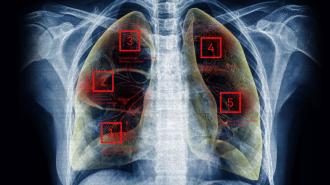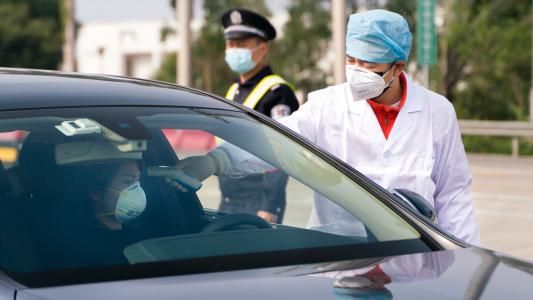Several Chinese groups say they’ve developed artificial intelligence systems that can detect coronavirus infections in seconds — far faster than human doctors.
To minimize the spread of COVID-19, the respiratory disease caused by the novel coronavirus SARS-CoV-2, health officials need to be able to quickly tell whether or not a patient is infected.
The AI can detect coronavirus infections in CT scans in just 20 seconds and with 96% accuracy.
As the outbreak has spread, researchers have scrambled to develop new diagnostics tests for the disease, including kits doctors can use to identify the virus from cheek swabs.
However, those kits still aren’t widely available, and currently, the best way for doctors to detect coronavirus infections is through CT scans (incredibly detailed 3D X-rays).
The problem with CT scans is that a doctor has to analyze them for signs of coronavirus. That can take up to 20 minutes, as some CT scans will include more than 300 images.
Enter: artificial intelligence.
A Better Way to Detect Coronavirus Infections
Using 5,000 confirmed cases as their training data, scientists at the Alibaba DAMO Academy built an algorithm they claim can detect coronavirus infections in CT scans in just 20 seconds and with 96% accuracy, according to Chinese outlet Sina Tech News.
In February, Qiboshan Hospital in Zhengzhou became the first place to use Alibaba’s AI to detect coronavirus, and an additional 100 hospitals reportedly plan to adopt the system.
Alibaba’s isn’t the only AI helping doctors to detect coronavirus in CT scans, either.
“As more and more scans are done, then the algorithm learns and improves accuracy.”
Velislava Petrova
Days after Alibaba unveiled its system, researchers from Ping An Smart City’s healthcare subsidiary, Ping An Smart Healthcare, launched their own slightly faster, slightly less accurate AI.
“The system can generate smart analysis results (of CT scans) in around 15 seconds, with an accuracy rate above 90%,” Geoff Kau, co-president and chief strategy officer of Ping An Smart City, said in a press release.
Ping An’s AI doesn’t just detect coronavirus infections, either. It can also compare multiple scans from a single COVID-19 patient, measuring lesions to help doctors track how the disease is progressing.
Within nine days of the AI’s launch, more than 1,500 medical institutions had used it to read the CT scans of more than 5,000 patients, according to Kau.
Tweaking Existing AI Tech
Beijing startup Infervision is also helping speed up the detection of coronavirus infections in China, but it didn’t need to develop an AI from scratch to do so.
Instead, it modified one it had already released for the detection of cancer and pneumonia in CT scans. Health officials have reportedly already used that system to review more than 32,000 cases at 34 hospitals.
“Doctors no longer need to engage in the lengthy process of manually reading images one by one to identify high risk cases, while coronavirus-probable patients wait around the hospital posing a severe risk of infecting other patients and hospital staff,” Infervision’s founder Kuan Chen told The Lancet.
Infervision says the system needs just 10 seconds to detect coronavirus, but doesn’t note how accurate it is. Still, chances are all of these algorithms will only get better with time.
“As more and more scans are done, then the algorithm learns and improves accuracy together with the virus,” virologist Velislava Petrova, who wasn’t involved in the creation of any of the above AIs, told The Lancet.






